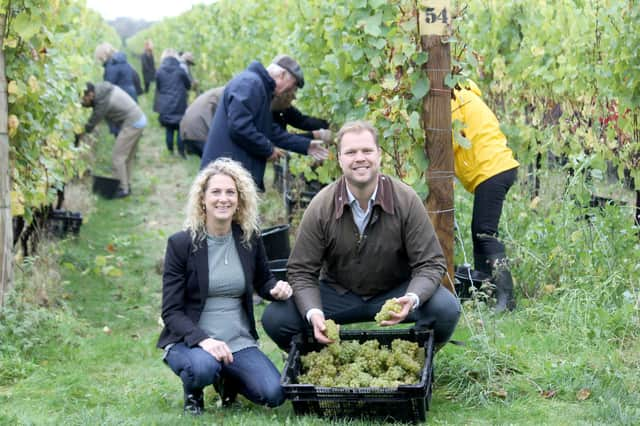Meet the family behind Chichester's popular vineyard Tinwood Estate


This is a normal morning for him. If little Jake isn’t in tow then Art is joined by his golden labradors Bubbles and Fizz who join in greeting the workers and pruning crops.
Now the boss of Chichester’s Tinwood Estate, Art took over his dad’s lettuce farm when he was 21, tearing up the unprofitable plants and planting vines instead.
Advertisement
Hide AdAdvertisement
Hide AdHe says: ‘My parents, Aad and Marjolein, emigrated from Holland to Britain in 1983.
‘I have grown up on this land and my parents used to farm lettuces, selling them to Sainsbury’s or Asda.
‘The sales were very good in the 1980s and 1990s but during the early 2000s, a medium family farm trying to grow fresh produce for Sainsbury’s and Asda was becoming increasingly difficult.’
Before Art left home to study agricultural business at Wye College, Kent, his father Aad told him the future of the family lettuce trade was looking bleak.
‘That was quite daunting to hear,’ admits Art.
‘But farming is in my blood.
Advertisement
Hide AdAdvertisement
Hide Ad‘There were lots of small vineyards in Kent and I spent a lot of time on them, because I focused on them for my dissertation.
‘A couple of the growers I met said if you have well-drained land, it’s perfect for vines. But chalk is a winner.
‘It got me thinking because Tinwood has both.
‘I came home and said we have to start planting some vines. My dad first said “how long is it going to take and how much is it going to cost?”’
When you picture vineyards, you’re most likely to dream up a Meditteranean farm with plenty of warm weather. Therefore Chichester may not even cross your mind but according to Art, his vines are in a perfect location.
Advertisement
Hide AdAdvertisement
Hide AdHe explains: ‘There’s a lot of flint in the ground, meaning rain can drain easily. There are similar soils in Champagne and Burgundy.
‘Our location is vital – we’re three miles from the sea which helps keep my biggest fear at bay: frost.
‘North of us, we have the rolling hills of the South Downs and then south of us, the Isle of Wight breaks up rain clouds.’
While vineyards are found across the whole of England, the southern climate has made it a popular region for growing vines, especially in Hampshire, Sussex and Kent. In 2015 Champagne Taittinger even purchased a vineyard in Kent to produce an English sparkling wine.
Advertisement
Hide AdAdvertisement
Hide AdArt insists that growing vines ‘is not a get-rich-quick scheme’ and ‘it takes years before you get a glass of wine in your hand’.
But with the support of mum Marjolein, dad Aad and wife Jody, Tinwood estate has transformed from a struggling lettuce farm into a thriving vineyard.
‘We got a partnership with Ridgeview Wine Estate, north of Brighton, who were instrumental in helping us during our first few years.
‘We had our first harvest in 2009, but it was only small because the grapes were so young.
Advertisement
Hide AdAdvertisement
Hide Ad‘In 2010, we had our first commercial harvest but we didn’t taste our first glass of sparkling wine until 2013. The grapes went to Ridgeview, then it had to age in the bottle to get the fizz for three years.
‘In 2013, we opened our small tasting room. That was a very proud moment.
‘We were working hard for years without even knowing what the wine would taste like.
‘Then in 2016, we built the lodges so people would be able to stay at the vineyard. In 2019, we opened our larger tasting room so we can host vineyard tours of 30-40 people.’
Advertisement
Hide AdAdvertisement
Hide AdWhen Covid-19 struck in March, Art and his wife Jody were working all hours to ensure the vines were healthy before harvest in September.
‘It was hard work at first with just me on the vineyards and Jody doing the admin in the office,’ says Art. ‘I brought back my seven full-time vineyard staff as soon as I could because I couldn’t cope on my own. There is plenty of space to social distance.’
The vineyard is divided with chardonnay grapes taking up half, 20 per cent is pinot meunier and 30 per cent pinot noir grapes.
Art says: ‘Our vineyard produces lovely, dry sparkling wines. We still live on the farm and my parents have the great job of quality control – meaning they can taste the wine a lot.’
For more information, go to tinwoodestate.com.
Enjoy more English wine at these vineyards
Advertisement
Hide AdAdvertisement
Hide AdWith more than 700 vineyards in the UK, what better way is there to learn more about our country’s award-winning wine than to visit a vineyard?
:: Denbies Wine Estate, Dorking, Surrey: Established in 1986, this is England’s largest vineyard with 265 acres, and is one of the largest wine producers in the UK. Denbies’ wine has won multiple gold awards for sparkling wine production. Go to denbies.co.uk.
:: Camel Valley, Bodmin, Cornwall: The first English wine producer to be granted a royal warrant, this tour is fit for a prince. The vineyard was founded in 1989 and produces 10 wines, as well as sparkling cider. Go to camelvalley.com.
:: Kingscote Estate, East Grinstead, West Sussex: Kingscote’s first vines were planted in 2010 and now the vineyard produces more than 100,000 bottles a year. This 150-acre vineyard also offers clay pigeon shooting or a spot of fishing at the picturesque Leggett Lakes. Go to kingscoteestate.com.
Advertisement
Hide AdAdvertisement
Hide Ad:: Ridgeview Wine Estate, Ditchling Common, East Sussex: Nestled at the foot of the downs in the village of Ditchling, Ridgeview wine began in 1995 and now produces more than a quarter of a million bottles sold across the world. Go to ridgeview.co.uk.